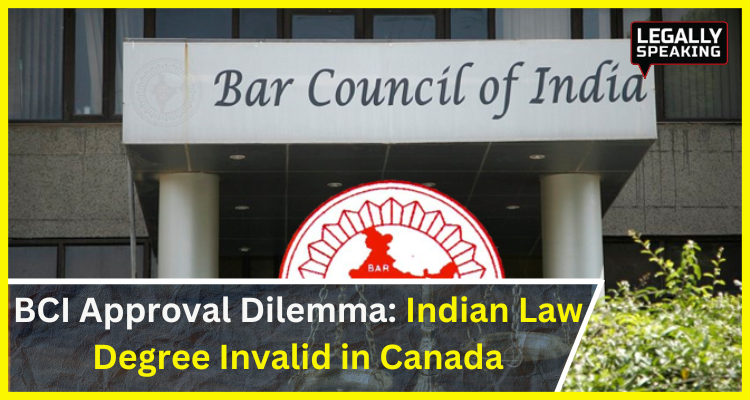
When Garima Randhawa wanted to shift to Canada and continue her practice there, she was shocked to discover that she had been denied a Certificate of Qualification from the National Committee of Accreditation (NCA).
The NCA is a body that evaluates the legal education and professional experience of people who acquired their qualifications outside of Canada.
To her shock, she was puzzled when she received a reply in February 2024 that read, “You commenced your studies in 2010, and according to the publicly available list of approved programs provided by the BCI, approval of the University of Mumbai, MGM Law College expired with intake 2008/2009. While you graduated with a Bachelor of Laws, you were not awarded a Qualifying Law Degree recognized by the BCI.”
Garima Randhawa, who graduated from Mahatma Gandhi Mission (MGM) Law College in Navi Mumbai in 2015 and is certified to practice by the Bar Council of India (BCI), was surprised to learn that she couldn’t practice law in Canada due to her college not being approved by the BCI.
Garima Randhawa later moved to BCI but didn’t receive any response, but when she verified it herself, she discovered that MGM Law College was not listed among the BCI-approved colleges. When I contacted the college about this issue, I was informed that it was impossible because they have consistently paid the renewal fee for approval.
The college’s principal, Sheela Hosnani, stated, “We have paid the renewal fee as required consistently. However, the BCI has not conducted any inspections. Now that this issue has come to light, submitting a compliance report will be our top priority.” Hosnani added that she assumed the role of principal just a year ago and was unaware of this situation.
In response, the BCI clarified that Randhawa received her certificate of practice despite her college not being on the approved list because BCI Maharashtra issues certificates based on the university rather than the college. Ashish Deshmukh, a member of BCI Maharashtra, explained, “The certificate of practice was granted based on the degree from Mumbai University, a recognized institution. This underscores the need for further refining the process, and we will now request the names of colleges from the respective applicants.”
This issue is of paramount importance, as it not only affects Garima Randhawa but also numerous students who may be unaware that their college lacks affiliation with the appropriate institution, potentially leading to future difficulties. Just last week, the Bar Council of India (BCI) distributed a circular to vice chancellors and higher education departments across the country, soliciting their cooperation in upholding the integrity and quality of legal education.
This circular follows the BCI’s expressed concerns regarding the proliferation of substandard law colleges in India. Authored by the Bar Council of India, the circular underscores the importance of conducting thorough inspections before issuing No Objection Certificates (NOCs) for new legal education establishments. Such measures are indispensable for upholding the standards of legal education and guaranteeing the proficiency of prospective legal practitioners.
However, it is equally imperative to devise a solution that prevents innocent students, who may be unaware of their college or university’s lack of recognition, from suffering adverse consequences. Finding a balance between ensuring educational quality and protecting students’ interests is essential for fostering a robust and equitable legal education system.




